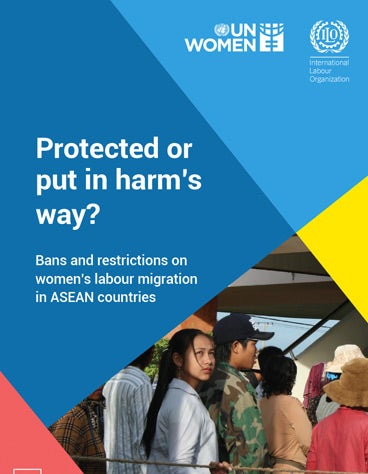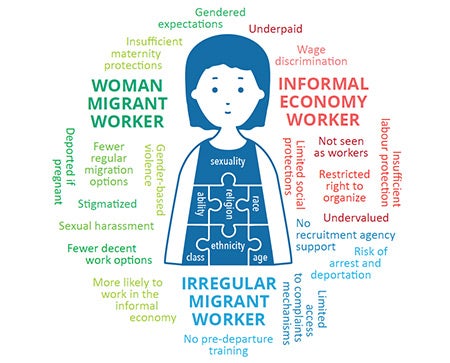
Protected or put in harm’s way?

This study includes a policy mapping of restrictions on women’s migration in ASEAN, and looks in detail at two particular policy restrictions: the 2014 Myanmar ban on migration to any country for domestic work, and the 2011 Cambodia ban on migration to Malaysia for domestic work. These policy restrictions were chosen because these countries are in the scope of the ILO TRIANGLE in ASEAN programme and the UN Women project ‘Preventing the Exploitation of Women Migrant Workers in ASEAN’, and because they affect domestic work – a major sector of work for migrant women in the region and around the world. It is hoped that other countries in ASEAN will be able to use findings of this report to guide future policy-making.
The two bans in focus here specifically target domestic workers, thus the report has a sectoral focus on domestic work. Data from 2013 indicates that there were 2.23 million migrant domestic workers in the South-East Asia and Pacific subregion, 91 per cent of whom were women. As domestic work is a women-dominated sector, the bans primarily impact and discriminate against women.
Summary of research findings

- Myanmar and Cambodian women migrated for domestic work, despite the 2014 Myanmar ban on migration for domestic work and the 2011 Cambodian suspension on migration for domestic work to Malaysia.
- Migration restrictions limited women to irregular channels for exiting their countries of origin. This left an absent or partial “legal trail” for accountability in country of origin recruitment systems.
- The bans resulted in an increase of small, unregulated recruiters in Myanmar and Cambodia. During the bans, Myanmar and Cambodian migrant domestic workers faced increased deception in recruitment, including contract substitution.
- Myanmar and Cambodian migrant domestic workers interviewed said migration costs increased, as informal payments had to be paid at exit ports and when they transited through third countries.
- During bans, women migrant workers did not have access to protective elements afforded by regular migration, including pre-departure training, standard employment contracts, access to complaints mechanisms, or recourse to a regulated recruitment agency or origin government assistance.
- Read more